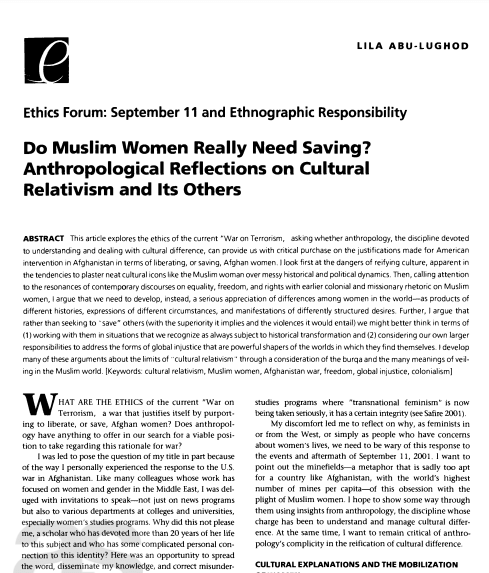Do Muslim Women Really Need Saving? Anthropological Reflections on Cultural Relativism and Its Others

| Title | Do Muslim Women Really Need Saving? Anthropological Reflections on Cultural Relativism and Its Others |
| Author | LILA ABU-LUGHOD |
| Overview | The article “Do Muslim Women Really Need Saving? Anthropological Reflections on Cultural Relativism and Its Others” critically examines the ethics surrounding the justification of American intervention in Afghanistan, particularly the narrative of liberating Afghan women. The author challenges the oversimplification and reification of culture, particularly the portrayal of Muslim women as symbols needing rescue. This narrative, the article argues, echoes colonial and missionary rhetoric, where Western powers historically used the plight of women to justify their own interventions. The author emphasizes the importance of understanding the diverse circumstances and histories that shape the lives of women worldwide, rather than imposing a singular narrative of liberation. The article critiques the tendency to focus on cultural explanations, such as veiling, over the more complex historical and political dynamics that contribute to the conditions in regions like Afghanistan. The discussion includes an analysis of the burqa, highlighting its historical and cultural significance beyond its use by the Taliban, and questioning the assumption that liberation would naturally lead to its abandonment. The article also reflects on the broader responsibilities of addressing global injustices and proposes that instead of attempting to “save” others, it is more ethical to work collaboratively in contexts subject to historical change. The author urges a move away from viewing Muslim women as mere symbols within a cultural narrative and towards a deeper understanding of the global interconnections and injustices that shape their lives. This approach, the article suggests, would foster a more nuanced and respectful engagement with cultural differences. |
| Download Link | click here to download |